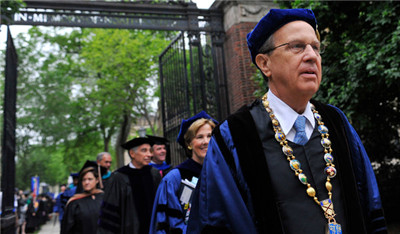(单词翻译:单击)
Gregory Fenves recently got a big promotion, from provost to president of the University of Texas at Austin. A raise came with it. Instead of his current base of about $425,000, he was offered $1 million.
格雷戈里·范韦斯(Gregory Fenves)最近晋升要职,从德州大学奥斯汀分校(University of Texas at Austin)教务长升任校长。此次升职是包含加薪的。他目前的基础薪俸约为42.5万美元(约合263万元人民币),校方开出100万美元。
And he rejected it — as too much.
但他拒绝了——理由是太高。
“With many issues and concerns about administrative costs, affordability and tuition, such a salary will affect the ability of the president to work with the Texas Legislature,” Fenves wrote to a university official, in an email obtained by The Austin American-Statesman and published last week.
“鉴于对行政支出、负担能力、学费等诸多问题的担忧与考量,这样的薪俸将影响校长与德州议会(Texas Legislature)的合作,”范韦斯在一封致某大学官员的电子邮件中写道,该信由《奥斯汀美国政治家》(The Austin American-Statesman)获得,并于上周刊发。

He suggested, and agreed to, $750,000.
最终他提议并接受了75万美元。
That’s hardly chump change. But in the context of the shockingly lucrative deals that have become almost commonplace among college presidents, the sum — or, more precisely, the sentiment behind it — is worthy of note and praise.
这当然不算是一笔小数目。但相比在大学校长中已经司空见惯的天价合约,它——或者更准确的说,它所透露的观念——是值得留意和称赞的。
Another of those deals came to light late Tuesday night, when The Wall Street Journal reported that Yale University had paid its former president, Richard Levin, an “additional retirement benefit” of $8.5 million after he retired from his post in 2013. The Journal characterized this as an “unprecedented lump-sum payment” for a college president and noted that Levin’s annual compensation package during his final years at Yale was already over $1 million.
周二深夜,《华尔街日报》(The Wall Street Journal)曝光了另一份类似的合约,2013年理查德·莱文(Richard Levin)卸任后,耶鲁大学(Yale University)向这位校长支付了一笔850万美元的“额外退休金”。《日报》形容这笔一次总付的退休金在大学校长中是“前所未有的”,并指出莱文在执掌耶鲁的最后几年里,年薪已经在100万美元以上。
All in all, few presidents give adequate thought to the symbolism and dissonance of extraordinarily generous salaries, which are in sync with this era of lavish executive pay and glaring income inequality but out of line with the ostensible mission of academia.
总的来说,很少有大学校长充分考虑到,这些令人咋舌的高薪有怎样的象征意义,看上去会有多么刺眼,它们和这个时代对企业高管的慷慨以及触目惊心的贫富差距是相符的,但却与学术界声言的使命相去甚远。
Ideally, higher education is dedicated to values different from those that govern Wall Street and corporate America. It supposedly calls students to more soulful concerns, even to sacrifice.
按理说,高等教育的价值观应该有别于华尔街和美国企业界。它本应将学子引向更高尚的追求,甚至是牺牲。
But that message is muddled when some of the people who run colleges wallow in payments and perks that would once have been considered vulgar.
然而,当一些大学的管理者享受着曾被斥为鄙俗的高薪和待遇时,学生们看在眼里会感到困惑。
For E. Gordon Gee’s final year as the president of Ohio State University, which he left in 2013, he got a package of more than $6 million, as was widely reported. It was a one-time bonanza, including deferred payments and severance, but he’d earned roughly $2 million annually over the previous years.
俄亥俄州立大学(Ohio State University)校长E·戈登·吉(E. Gordon Gee)于2013年卸任,任内最后一年他的薪俸超过了600万美元,当时媒体广为报道。那是一次性支付的奖酬,包括了延期付款和遣散费,但此前几年里,他的年薪已经在200万美元上下。
The Chronicle of Higher Education analyzed salary information for private colleges from 2012, the most recent year available, and found that Shirley Ann Jackson, the president of Rensselaer Polytechnic Institute, received a package worth over $7 million.
《高等教育纪事报》(The Chronicle of Higher Education)分析了2012年私立大学的薪俸信息,也就是现有数据所及的最近一年,他们发现伦斯勒理工学院(Rensselaer Polytechnic Institute)院长雪利·安·杰克逊(Shirley Ann Jackson)拿到了超过700万美元的薪俸。
John L. Lahey of Quinnipiac University: about $3.75 million. Lee Bollinger of Columbia University: almost $3.4 million.
昆尼皮亚克大学(Quinnipiac University)的约翰·L·雷希(John L. Lahey):约375万美元。哥伦比亚大学(Columbia University)的李·鲍林杰(Lee Bollinger):将近340万美元。
Fenves’s salary as the president of the University of Texas puts him well behind that of his counterpart at Texas A & M University, who has an annual base of $1 million plus $400,000 in additional compensation, according to The American-Statesman.
据《美国政治家》的报道,范韦斯作为德州大学校长的工资要比德州农工大学(Texas A&M University)校长低很多,后者的基础年薪是100万美元,外加40万美元的额外报酬。
Each profligate compensation package breeds more like it, as schools’ trustees convince themselves that they must keep pace in order to recruit, retain and receive the precious fairy dust of the heaviest hitters.
每出现一个漫天高价的薪酬包,都会促使更多的学校跟进。校董们认定,要想招募、挽留最抢手人才,并领受其恩泽,他们必须跟上时代的步伐。
They reason that “this is a winner-take-all society and that people with extremely high levels of talent are richly rewarded,” said Richard Vedder, the director of the Center for College Affordability and Productivity.
他们的理由是,“这是个成王败寇的社会,具备最顶尖才能的人要得到丰厚的回报,”大学学费与绩效中心(Center for College Affordability and Productivity)主任理查德·韦德(Richard Vedder)说。
“But I think that things are getting out of hand, especially given the tax-exempt nature of universities,” he told me. “They’re in privileged positions, and they were given these privileged positions not to enrich themselves but to serve society. These presidents are expected to live quite nicely but not exorbitantly and not extravagantly.”
“但我认为现在有些失控了,尤其是考虑到大学的免税待遇,”他对我说。“他们是享受着特权的,而之所以给他们特权,不是为了让他们逐利,是要他们服务社会。这些校长理应过上优越的生活,但不能这么穷奢极欲。”
Their extravagance strikes an especially discordant note in light of the challenges confronting higher education today, and it undercuts their moral authority.
在高等教育面临严峻挑战的今天,他们的奢侈无度尤显不协调,并且有损他们的道德威严。
How do you defend the transfer of teaching responsibilities to low-paid, part-time adjuncts when the president is sitting so pretty? How do you cut administrative costs, which indeed need cutting? How do you explain steep tuition increases, mammoth student debt and the failure to admit more children from poor families?
一个锦衣玉食的校长,该如何解释将教学责任转给低薪的兼职教授的举措?如何下手削减行政开支——尽管的确有削减的必要?你如何解释学费的暴涨,巨额学生债,无法接收更多穷人家的孩子?
How do you summon students back to the liberal arts and away from mercenary priorities?
你如何呼吁学生们放弃唯利是图的专业方向,重拾对文科的兴趣?
The high salaries are frequently defended on the grounds that a university president’s job is all consuming. But if it is, how do so many of them find time to serve, for hundreds of thousands of extra dollars, on corporate boards? Rensselaer’s Jackson was at one point on five boards simultaneously.
大学校长的工作极为繁重,这也是给他们开出高薪的一个常见理由。但如果真的如此,为什么还有那么多校长进入企业董事会,额外再赚上几十万美元?伦斯勒的杰克逊一度身兼五家企业的董事。
The high salaries are also defended in terms of the fund-raising that certain presidents reputedly excel at, covering their compensation many times over. But do they deserve sole credit for those donations? And at nonprofit institutions, should money be the main yardstick and currency? Shouldn’t ethics compete with economics, as they sometimes do when a school invests its endowment?
高薪的另一个理由是某些校长被认为格外擅长筹款,比起他们为学校筹措到的资金,他们的薪水只是个零头。但是争取到那些捐款的功劳,应该记在他们一个人头上吗?在一个非营利机构,金钱应该成为主要衡量标准和通货吗?难道不应该将伦理置于和经济同等的地位来考虑?要知道有时候学校在决定如何用捐赠基金投资时,就会这样考虑。
The lofty pay of college presidents is part of higher education’s increasingly corporate bent, of the blurred lines between the campus and the marketplace.
高等教育越来越有企业的作派,校园和市场的界线渐渐模糊,校长的高薪就是其中一个表现。
And like the private enrichment of many political candidates who speak of “public service,” it’s not just a mirror of our pervasive money culture. It’s a green light for it, from precincts of principle where a flashing yellow would be more appropriate.
和许多一边说着“公共服务”一边揽聚私人财富的政治候选人一样,它不只是四处蔓延的金钱文化的映照。它是在给这种文化开绿灯,而在这个固守志节的界域中,理应不断闪动的是一盏黄灯。


